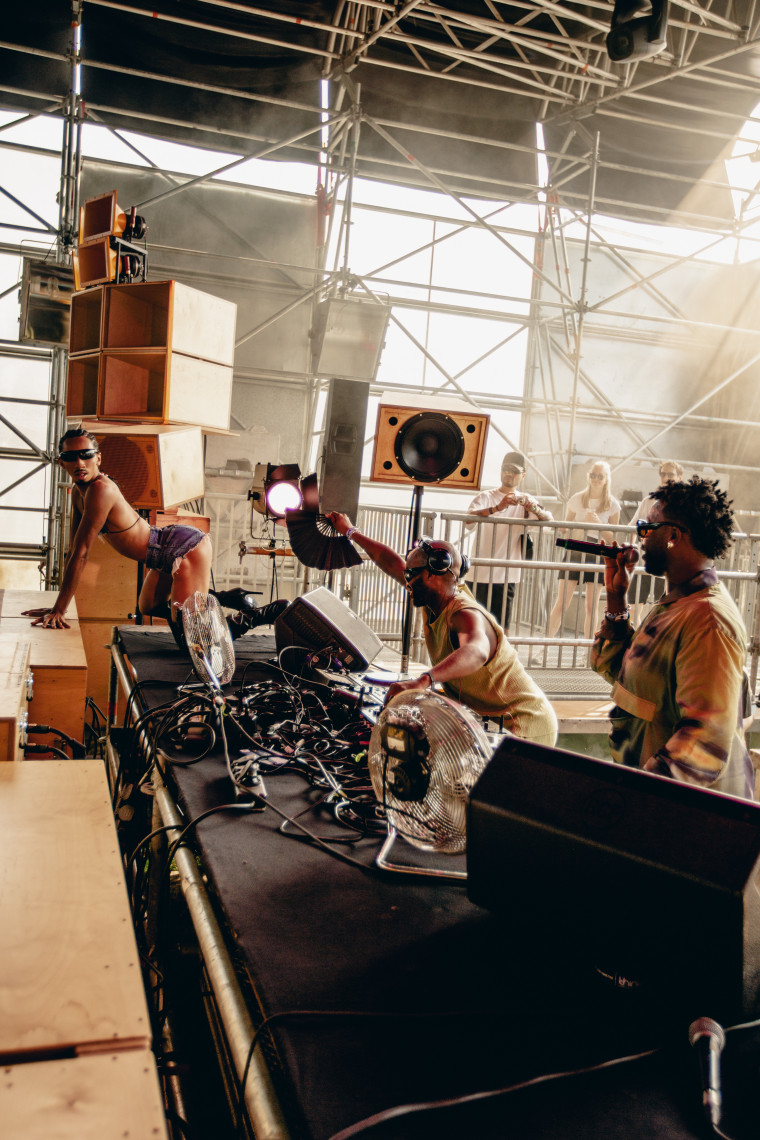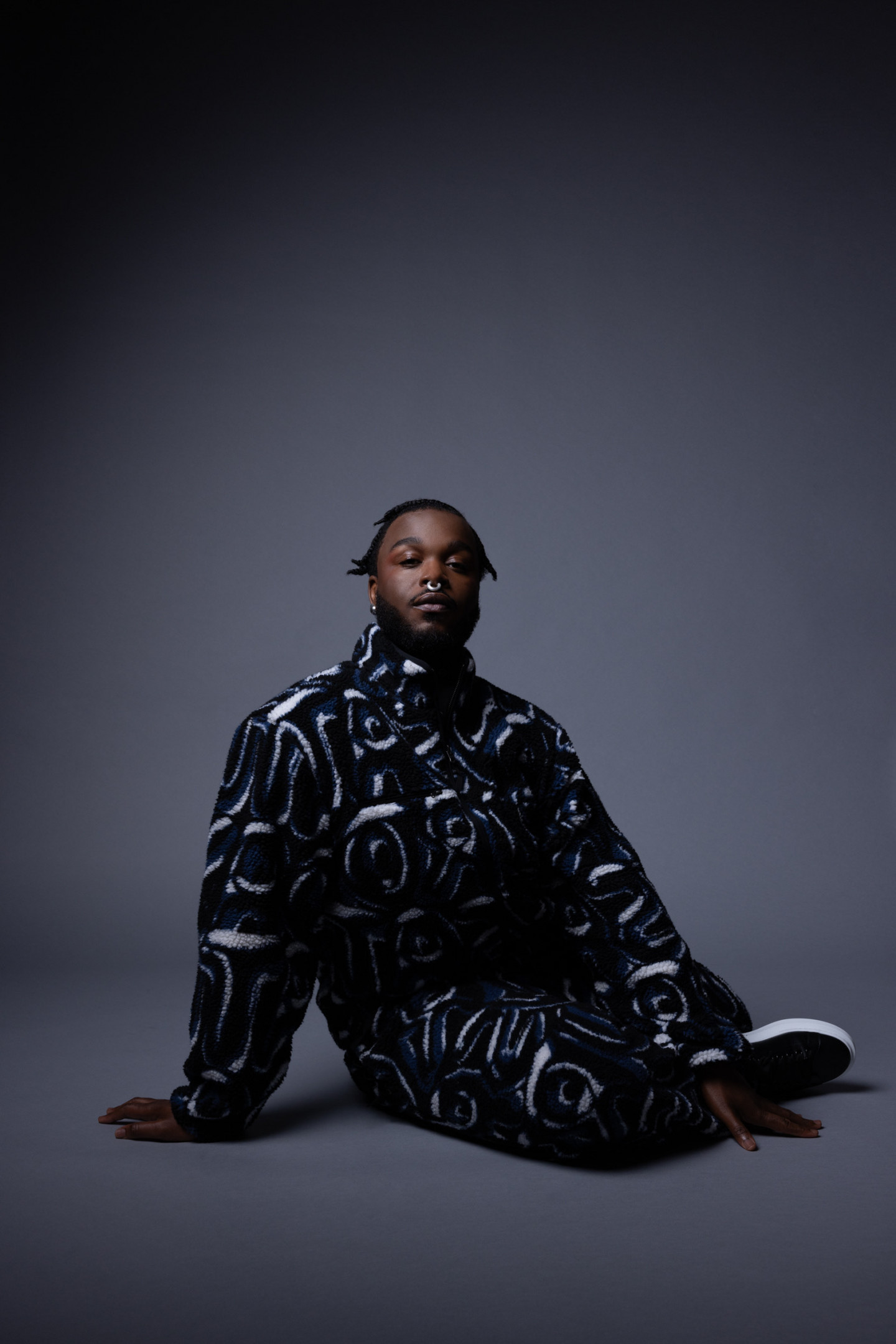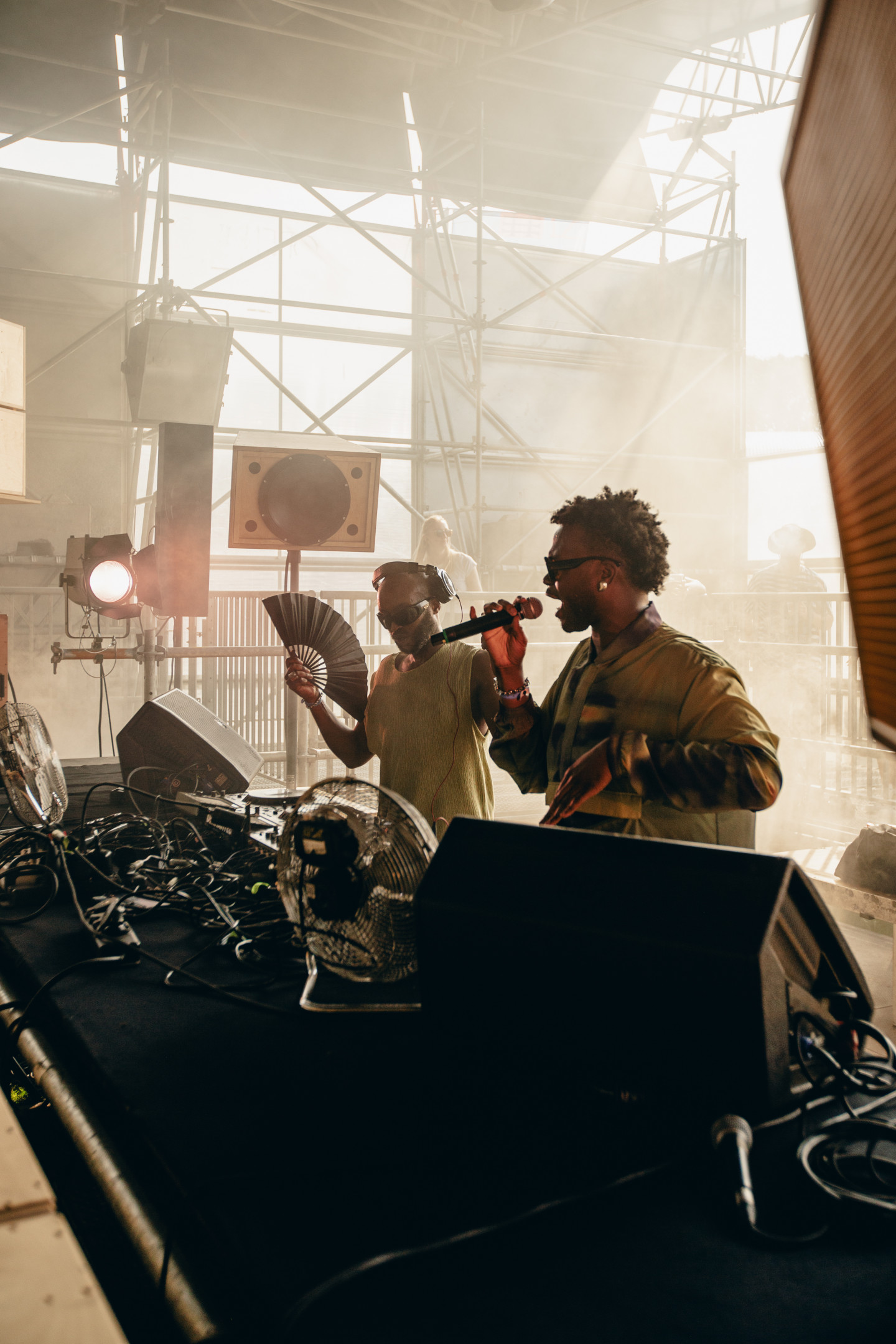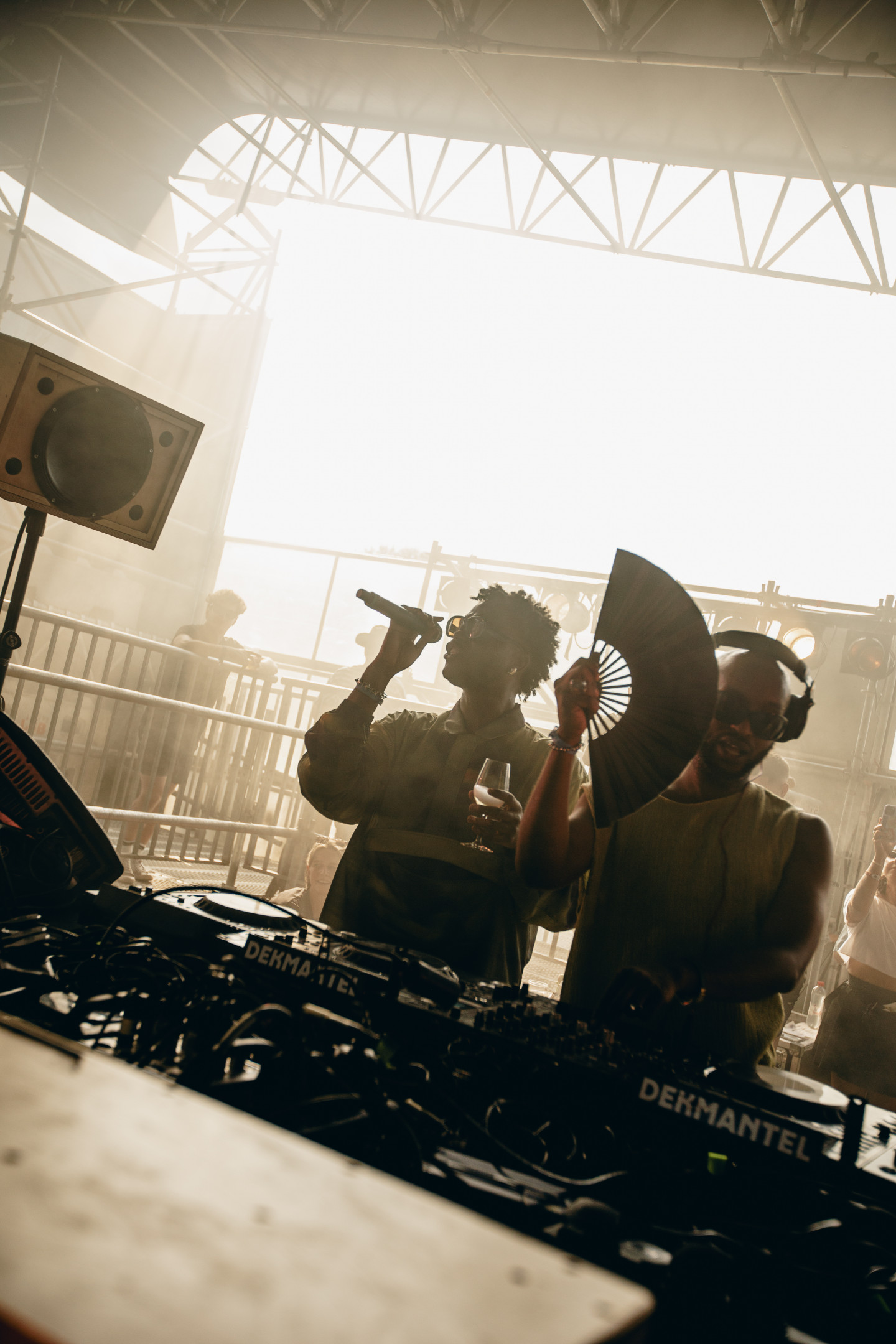Over the last decade, Rashard Bradshaw aka Cakes da Killa has been based in and performing throughout New York, where he’s been a mainstay in the city’s thriving underground rap and club music scenes; two vastly different musical landscapes which converge via queer club nights in Brooklyn and beyond.
Cakes grew up in New Jersey, where he pulled inspiration from the state’s rich club music roots. Although, geographically, he was at the heart of club music, back then the industry was dramatically different from what it is now for visible, Black queer artists making a name for themselves in rap music.
Words by Claire Mouchemore
Photos by Ebru Yildiz (portrait) & Pierre Zylstra (live performance)
When I catch up with Cakes one afternoon in mid-July, I find him in Berlin, juggling the beginnings of a new record and a lengthy European summer tour which he’s on to celebrate the release of his latest album, Black Sheep. Aside from putting out his slow(er) and sultry eleven-track record, Cakes’ has released in excess of ten projects, in the last four years alone. “No rest for the weary,” Cakes says, referencing his continuous output, chuckling to himself on the other end of our WhatsApp call.
The last few years have seen you tick some big festivals off your live-performance-bucket list; from Glastonbury to Sonar, and now, this summer, you’re making your Dekmantel debut. Let’s rewind a decade: where was the first show you have ever played?
It was a house party in Brooklyn. I believe it was run by an artist by the name of Ray Six. At the time having a big house party in Brooklyn with DJs and performers was a thing. I've always performed the mean - the gays are always performing, you know; but this was like, the first time there was an actual mic in my hand, and I was the centre of attention. And it came so naturally to me, and I crushed it. That experience really kept me going through the years as an independent artist.
When you started out in the NYC rap scene ten years ago there weren’t many visibly queer artists openly discussing queer themes in their music. How did you find and connect to your community of listeners?
Well, for me, I knew that I was going to have a community behind me in New York. When I was coming out and coming of age I found my people at the parties in the scene that I was living in. But as far as my music, it was all just for fun. I would record at Red Bull for free and then put things on SoundCloud. There wasn't really the pressure of, “oh, is this good music? Or is this bad music? Or is anyone gonna like it?” Because the concept of becoming an actual respected artist was never a reality. So I didn’t care and people saw that and started to fuck with me because of it.
How has being based in New York and moving between places like New Jersey, Philadelphia and Baltimore influenced your sound?
Obviously, when you talk about places like Philly and Jersey, where I'm originally from, you know you need to talk about club music. That's the thing there. I grew up listening to artists like M.I.A and like Rye Rye and DJ Tameil. My sonic palette was always intertwined with dance music, and so was my queerness, which is what helped me discover disco and house music. I find my music hard to categorise because I mix so many genres from my upbringing and the places I’ve lived at with my own take on ‘90s hip-hop grit. However, sticking to one genre was never my thing. Mixing those sounds was never a problem in my mind, because I saw artists like M.I.A. do that flawlessly. I just wanted to make the music that I wanted to hear and being close to those cities; I think that was what really put me on to different sounds and different vibes.
"My sonic palette was always intertwined with dance music, and so was my queerness, which is what helped me discover disco and house music."
When you first became interested in club music genres like Jersey Club, how did you discover new music, back when social media, Spotify, Bandcamp and SoundCloud weren’t really a thing yet?
My family is from Jersey City, which is closer to New York, so they listened to a lot more club music than I did growing up. When I was little I remember my cousin had a DJ Tameil CD in his car and I stole it because it had so many edits on it that the radio wouldn’t even consider playing at that time. I liked music growing up, but I was never like “oh, I'm gonna be a musician” or “music is my life”. It wasn't like that until I started hearing that kind of music that properly resonated with me, like Jersey Club edits of G Unit; the stuff that didn’t feel so heteronormative and began to feel like it had this more fluid twist on it in the edit version.
After stumbling upon and being heavily inspired by that DJ Tameil CD of edits, how did you then start making your own music?
Even when I listened to that CD and started finding other similar music, I still couldn't see myself making music because there weren't any openly gay people making music for me to look up to, aside from RuPaul and I knew I definitely wasn’t a drag queen. I had no point of reference, so I found it impossible to imagine being an artist one day. But when I was in college I wanted to be a journalist, and I would write out of boredom. In 2011, I started making these videos that would dis people on my college campus. A producer called Stixx saw one of these videos and hit me up to rap on his compilation mixtape called Downtown Mayhem Vol. 1. Naturally I said yes, because I’ll do anything for attention. That’s kind of what got the ball rolling. So, if Stixx never reached out to me to record, I probably wouldn't even have a recording career.
In terms of finding your footing in your lyricism and rapping, was there a defining moment where you were like, “oh, I've got something” like, “I've got a voice for this. I’ve got the flow and the rhythm to rap”?
I was completely unaware until Stixx approached me. I came up in a time when rap was a very serious art form. It wasn't fun and not just anyone could do it. I grew up listening to people like Busta Rhymes and Cam’ron, so I didn't know if I was on that level. But I knew that if I was going to do it technically I needed to be on some type of level. It wasn't until other people started hearing me record. It was other people's reaction that made me realise like, “oh, maybe you got something after all”. What also made it interesting was the fact that I was so effeminate and unapologetic about it. I stood up for myself and didn't give a fuck.

"It was other people's reaction that made me realise like, “oh, maybe you got something after all”. I stood up for myself and didn't give a fuck."
What's your process of writing lyrics and what inspires that lyricism?
I write all my own music, which I’ve recently realised isn’t the case for a lot of people. I write quickly if I’m in the mood. It’s a flow state that I get into, kind of like an athlete. Once I tap into that, I find my groove and really get going. In terms of themes, I reference my Black queer experiences and existing in this world. I talk about Black queer love a lot because I didn't know that would be considered revolutionary, but it isn’t a common thing. For a lot of people, it’s important to hear these kinds of stories and music. But yeah, love is definitely a big thing. Heartbreak is a big thing. And where does all that happen? In clubs and in nightlife, so those are kind of the main themes that I operate in. And drama - of course, drama, because there's always the drama.
Congratulations on your latest album, Black Sheep. Tell me about the record: how has it been received? What's it been like being on tour and sharing new music with crowds across the globe?
Thank you! It’s been incredible. I worked on the record with Sam Katz, who's been one of my longtime collaborators. I would send Sam concepts, and then he would build a world around that foundation, which is my favourite thing because it makes it more of a cinematic experience for listeners. I kind of wanted to do something that was a little more immersive than all of my other music, as opposed to just being pigeonholed into what people think queer rap sounds like. I was able to work with a lot of vocalists, write a lot of harmonies and collaborate with some amazing people, like Wuhryn Dumas, Stout and Dawn Richard. It's a little different from the usual Cakes stuff, but it’s me just being way more raw and honest.
How does performing in Europe compare to live shows back home, in the US?
Well, I've always been a European doll. It just feels as though dance music is consumed differently abroad versus in the States. And I think with what I do, I have to just go to the places, cities and countries where people actually get it. Not to say people don't like my music in North America, it’s just that the European girls just get it.
What can fans expect from a Cakes da Killa performance?
Except a high-energy, entertaining show, not your typical hip-hop show. It's hip-hop. It's cabaret. It's queer. It's camp. It’s cunt. It's entertaining from what some of the critics say.


